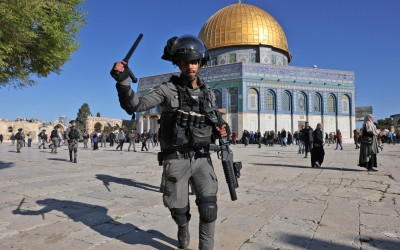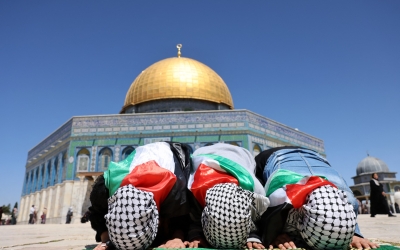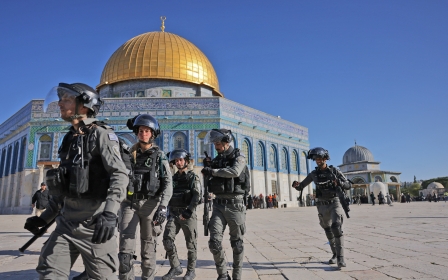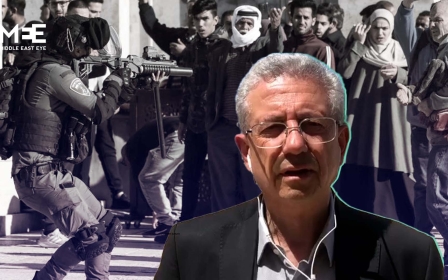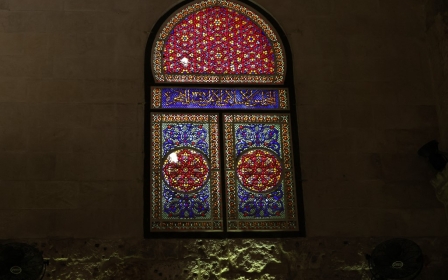Al-Aqsa: Why Palestinians fear Israeli raids will erode their rights to the mosque
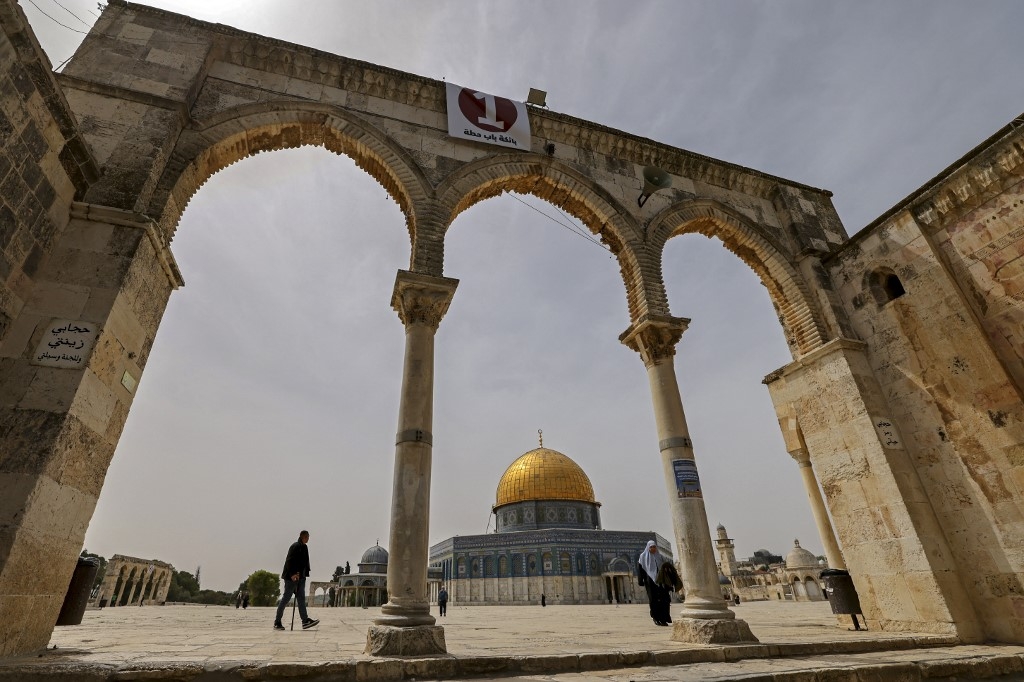
Palestinians fear the recent escalation of Israeli raids on al-Aqsa Mosque is part of a push to change the "status quo" inside the occupied East Jerusalem site, and could lead to it being divided between Muslims and Jews.
Since its military occupation of East Jerusalem's Old City, Israel has accepted that a Palestinian-Jordanian institution, the Islamic Waqf, will administer the site, including tours for non-Muslims, refurbishments and maintenance, and appointing guards.
However, Israel has been adamant since 2015, according to Palestinian observers, that it will curb the control of the Waqf, emboldening Israeli settlers' tours and giving the green light to "silent" Jewish prayers being held on the site.
Khalil Assali, a member of the Waqf council, told Middle East Eye that Palestinians fear Israel will allocate specific times for Palestinians to enter al-Aqsa to pray in designated areas and assign other times for Israelis and dedicate areas for them to pray.
Al-Aqsa would end up being similar to the Ibrahimi mosque in Hebron, south of the occupied West Bank, divided in time and space between Muslims and Jews since the 1990s.
"We refuse this Israeli policy," Assali told MEE. "In the past days, when Israeli forces emptied al-Aqsa of Palestinian worshippers in the morning, the time Israeli settlers enter the area, this was an action to divide the time slots for visiting the site."
In the past five days, Israeli forces violently raided al-Aqsa four times, assaulting Palestinians observing Ramadan and emptying the mosque to allow settlers to storm the site.
Facts on the ground
Assali said the Israeli government is implementing a slow-burning approach to impose facts on the ground in al-Aqsa. He referred to a shift in 2015 within the Israeli government regarding the site, known to Jews as the Temple Mount, where they believe two ancient Jewish temples once stood.
'The situation is terrible. Even if Palestinian Waqf's guard wants to take a lunchbox inside the site, he needs an Israeli's permission'
- Khalil Assali, a member of Waqf council
"[Former prime minister Benjamin] Netanyahu succeeded in making the site as part of the Israeli national identity, even for someone who is leftist. So the policy became that: to control Jerusalem, you need to control al-Aqsa first," Assali said.
The Prime Minister's Office under Netanyahu became directly involved in al-Aqsa by controlling the permits given to parliament members who wished to enter the site.
The Waqf's control has increasingly seen an Israeli clampdown since then, by preventing it from appointing guards without the approval of Shin Bet and cutting the electric wires for the speakers in the site.
"The situation is terrible. Even if a Palestinian Waqf guard wants to take a lunchbox inside the site, he needs an Israeli's permission. They prevent Waqf from fixing wobbly tiles which could cause injury to people, or from tending trees, or fixing a water pipe or sewerage," Assali said.
Changes after the Second Intifada
All the while, Israeli settlers and far-right activists have been allowed to storm the al-Aqsa in growing numbers, especially during Jewish holidays.
On regular days, they are allocated two times at which they enter the mosque almost daily, gaurded by heavily armed forces.
The number of visitors has grown steadily over the years. In 2009, 5,658 settlers entered the mosque in such stormings. In 2019, just before the Covid pandemic, the number rose to 30,000, according to some estimates.
Recently, an Israeli court ruled that only "silent" Jewish prayers are allowed in the area, which violates the terms of a delicate arrangement between Israel and Jordan, often referred to as the "status quo," which bans non-Muslim prayer inside the mosque.
But this was not always the situation. Assali said that, until 2000, prominent rabbis had issued an order prohibiting Jews from visiting the site until another temple was brought down from heaven.
Only tourists were allowed to visit the site, supervised by the Waqf under the "status quo" understandings.
"The Israeli flag was ordered to be taken down from atop the Dome of the Rock mosque in 1967 when Israel occupied the city. Menachim Begin, then the leader of the national unity government, had ruled against visiting the site for fear it would anger Muslims and Arabs," Assali said.
Israel then kept the "status quo" as it is, except for taking the key of the Morrocan Gate, which gave access to the Western Wall plaza.
All that changed after the 2000-2005 Second Intifada, when Israel changed it's policy to let settlers visit the site more frequently and revoked the Waqf's control over tourist visits.
With specific times now solidified for Israeli tours, Palestinians fear that what will come next is setting up prayer rooms for settlers within the walls of the mosque.
"They consider the eastern part of the complex as Jewish, around the al-Rahmh Gate area. The fear is they will set up a Jewish synagogue in al-Aqsa," Assali said.
Political battle
Amid all this, the mosque complex looms like a chessboard, where the opposition leader Netanyahu appears to be on offence to push Prime Minister Naftali Bennett's government into a zugzwang.
Netanyahu's allies, Itamar Ben-Gvir and Bezalel Smotrich, from the extremist Religious Zionism alliance, had spurred the calls to break into al-Aqsa during Ramadan and Passover.
With the same number of seats in parliament as the opposition, 60 for each, Bennett's government is one defection away from collapsing, and the tensions around al-Aqsa don't serve his alliance.
"Bennett has a weak government," Naser al-Hidmi, head of the Jerusalem Authority Against Judaisation, told MEE.
"He knows that if his government collapsed, he would have little chance to be prime minister again after another round of elections."
On Tuesday, Bennett criticised Netanyahu in a tweet, telling him: "Your legacy: Hamas rockets on Jerusalem. Lynches in Acre and Lod. Israel in flames. Fails against Hamas. We are repairing," in reference to violence in May last year.
Hidmi added that Bennett will do anything to remain in power.
"For now, this means pleasing the settlers and showing himself more radical than Netanyhau and that he would allow them to perform Jewish sacrifices, rituals and prayers in al-Aqsa, something Netanyahu did not do."
Middle East Eye delivers independent and unrivalled coverage and analysis of the Middle East, North Africa and beyond. To learn more about republishing this content and the associated fees, please fill out this form. More about MEE can be found here.


